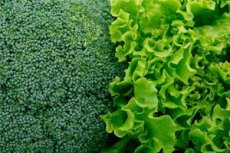Vitamin K: New Benefits Discovered
Last reviewed: 16.10.2021

All iLive content is medically reviewed or fact checked to ensure as much factual accuracy as possible.
We have strict sourcing guidelines and only link to reputable media sites, academic research institutions and, whenever possible, medically peer reviewed studies. Note that the numbers in parentheses ([1], [2], etc.) are clickable links to these studies.
If you feel that any of our content is inaccurate, out-of-date, or otherwise questionable, please select it and press Ctrl + Enter.

If you regularly include foods fortified with vitamin K in your diet, you can triple the risk or even prevent the development of atherosclerosis of the cardiovascular system. Such conclusions were expressed by experts representing Edith Cowen University, which is located in Australia.
Vitamin K is a fat-soluble vitamin substance that comes in two flavors:
- phylloquinone present in greens;
- menaquinone, produced by bacteria and found in some animal fermented foods (such as cheese).
Scientists from Australia have carefully researched information on more than 50 thousand patients who took part in a Danish experiment on the study of dietary characteristics, oncology and health, which lasted for 23 years. Everyone who took part in the project, at the start, filled out a special questionnaire containing questions about the characteristics of the meal. Further, the researchers compared the characteristics of nutrition with the frequency of hospitalization of patients with diagnoses of ischemic stroke, coronary heart disease, atherosclerosis of peripheral arterial vessels.
As a result, it was found that patients who regularly consumed a large amount of products containing vitamin K were almost 20% less likely to be hospitalized for cardiovascular pathologies, atherosclerotic diseases (especially those in which mainly peripheral arterial vessels are affected).
As one of the leading authors of the study, Professor Nicola Bondonno, assures, "vitamin K prevents the accumulation of calcium in the basic arterial vessels, blocking the development of vascular calcification."
Why is it only about the use of an increased amount of vitamin? The fact is that the existing medical recommendations relate only to the average daily volume of vitamin K, which is necessary to ensure adequate blood clotting processes, without taking into account the preventive role of this substance in preventing atherosclerotic pathology of the cardiovascular system. Experts insist: it is necessary to revise modern criteria and establish new norms for the use of vitamin K, taking into account the latter direction.
Vitamin K is found in many plant foods - in particular, cabbage, spinach, lettuce, broccoli, green peas, and strawberries. In addition, it can be obtained by eating chicken, beef liver.
By the way, an excess of a substance in the body, like its deficiency, is also not welcome, since an increased intake of vitamin K can provoke an increase in blood viscosity, the development of thrombosis and phlebitis. This phenomenon is considered to be quite rare, however, there is currently no upper limit for vitamin K intake.
The information is presented on the JANA magazine page
